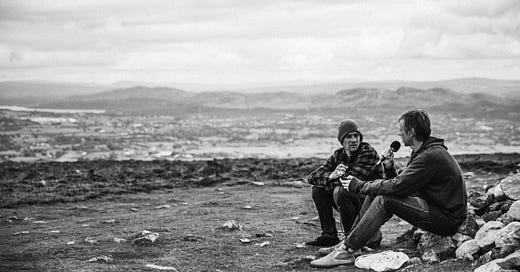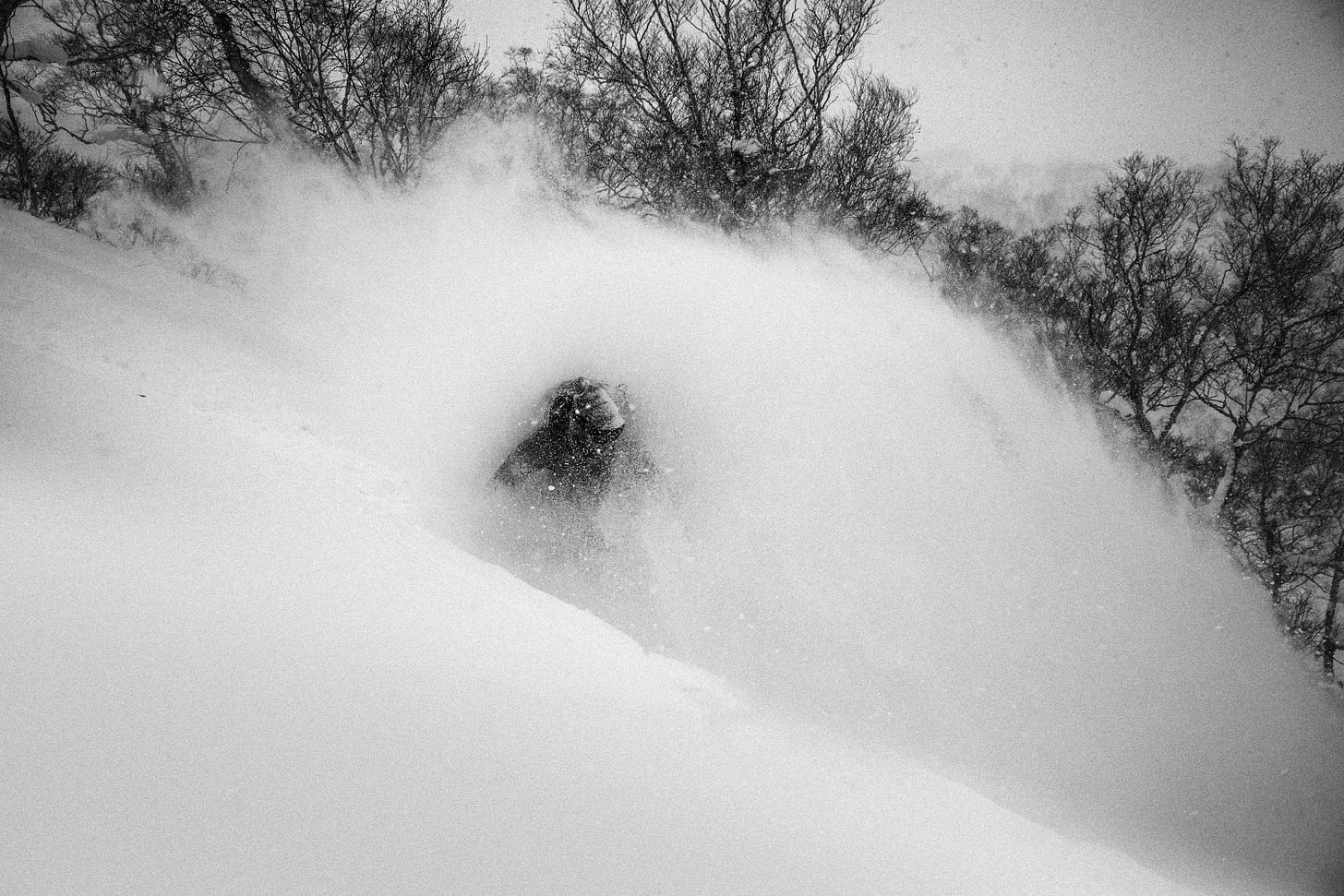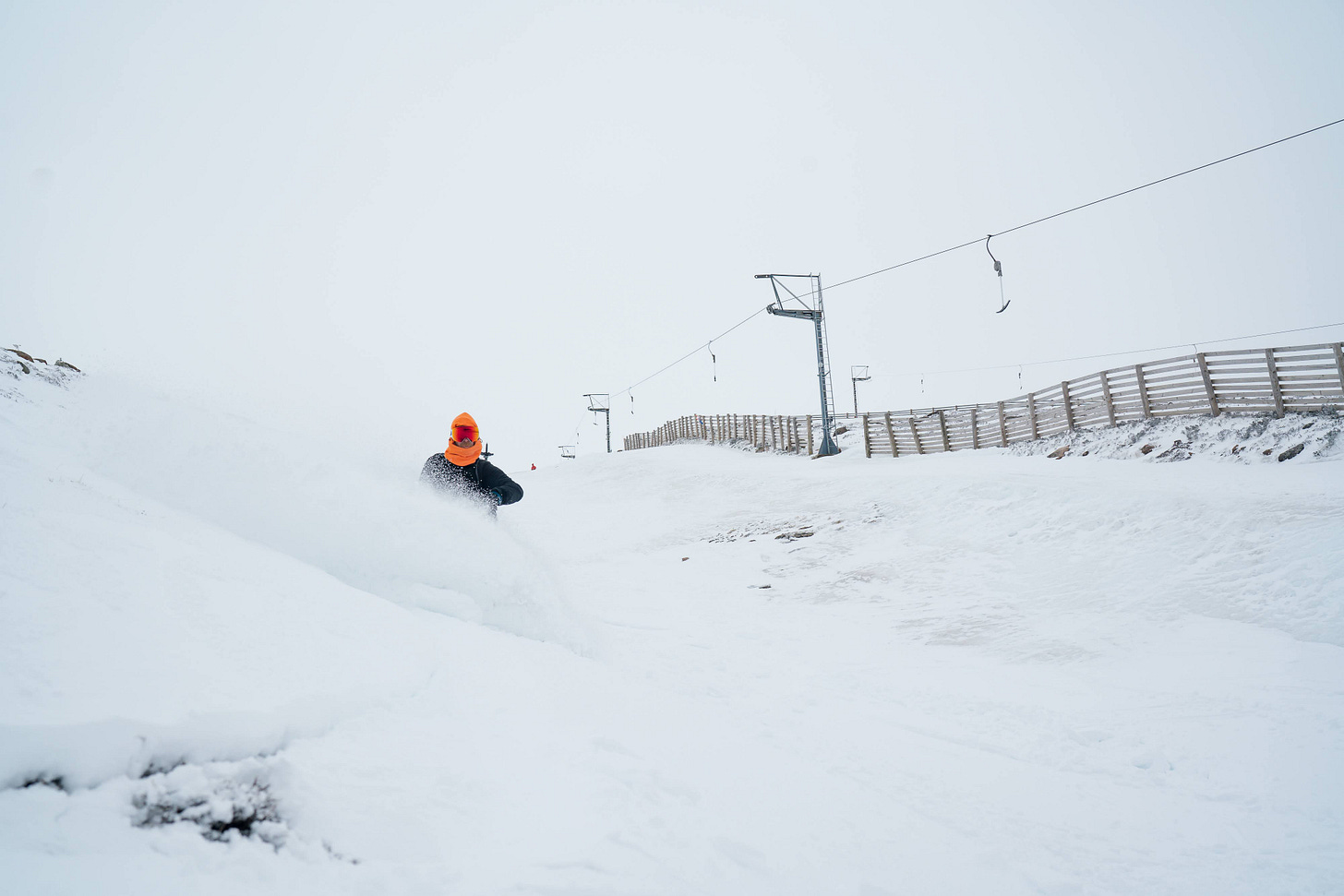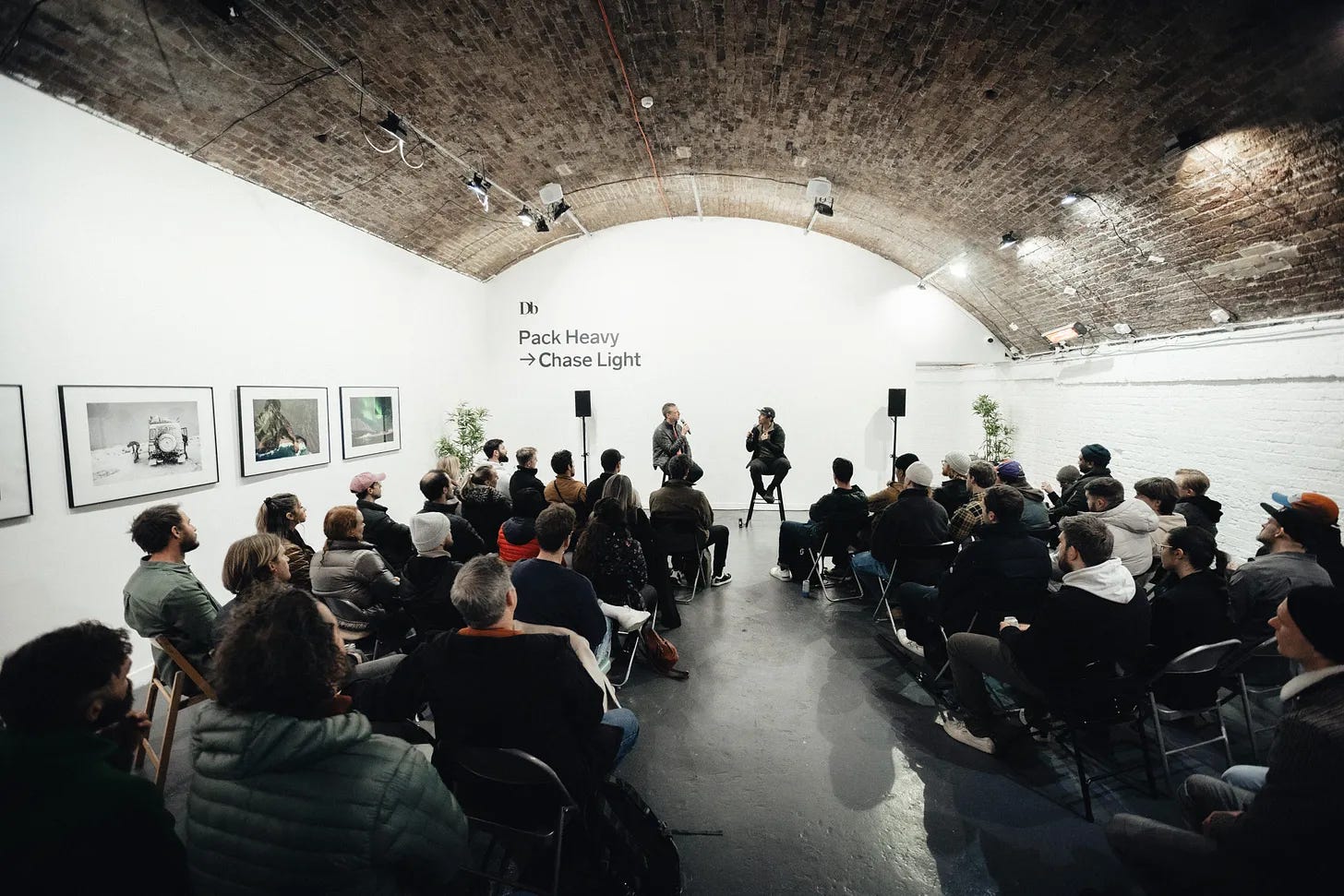“We’re all engaged in a kind of mass delusion, aren’t we?”
An interview with snowboarder, surfer, and host of the Looking Sideways podcast Matt Barr, who lives in Brighton
“[In the outdoor industry], we’re all engaged in a kind of mass delusion, aren’t we? This idea we can change stuff and participate in this brutal extractive system. I understand why the right kind of hates this strain of the left in that regard.”
I’ve known Matt for almost 20 years – he used to write for Cooler Magazine when I was editor – and he’s been a good friend ever since. I love what he’s built up with Looking Sideways, which is very much a must-listen podcast for me, so I was super interested to tune into his in-depth look at Yvon Chouinard’s decision to transfer ownership of Patagonia and make “Earth [their] only shareholder”.
The three-part documentary podcast gets into the weeds of the move, its implications and the wider purpose industry, and I found it really thought-provoking, so I was keen to interview Matt about it. I hope you enjoy our chat.
Hey Matt, how’s it going? Had any good local surfs lately?
I went to the Witterings last Saturday. It was smaller than anticipated but I took a massive board and got good waves.
Nice, I was there too, it was such a beautiful day. So, can I start by asking where the idea for The Announcement came from?
Since the early days of Looking Sideways, I’ve always wanted to take on a big project – to make a radio documentary – and seeing the reaction to Yvon Chouniard’s decision to transfer the ownership of Patagonia [to a specially designed trust and non-profit to fight the climate crisis] is what gave me the idea for the series.
Well, when the news came out, I reacted to it at face value, I thought it was a brilliant thing. But, as I get into in the podcast, the response to it became quite binary, as with most things that play out in the social sphere these days. He was either a genius, or a tax dodger.
It says everything about my filter bubble that I only read positive takes on the story…
I thought it would be good to actually have a proper look at it. And when I did, I realised it was as much about corporate philanthropy, capitalism, and democracy as it was about Yvon giving away the company.
You interview Carl Rhodes, who wrote a great long read for The Guardian back in 2021 on the dangers of corporate morality and who I once interviewed here. We all rightly lionise Yvon Chouinard but it’s also fair to say that when we rely on billionaires, however rad and worthy they might be, to decide which of society’s problems they want to solve it’s not great for democracy
Yeah, it’s a challenging thing for people to get their heads around in the current age because you back your team, don't you? And social media weaponises this, in the way you mentioned you only read positive takes on the Patagonia story.
But it’s weird as The Announcement already feels a little out of date, because I finished it before the election and Elon Musk kind of proved that point about wealthy individuals wielding unholy amounts of power. These people have got the most power of anyone ever, they've got the backing of global information systems for their every whim, and they’re in bed with the American government.
Should we allow wealthy individuals to have this much power? And I've had a couple of comments since the first episode came out, from people saying: “Wow, that's naive. That horse has already bolted.” But it’s only become naive since the US election, and it’s quietly terrifying.
If you consider someone like Andrew Tate, for middle aged people like us, we thought those battles around misogyny were won. But now if you assert that misogyny is bad in 2025, you’re woke. Social media has shifted everything so comprehensively, and these very loud voices have such an outsized influence.
I had that exact thought about Musk when listening to episode two. If Yvon Chouinard doesn’t channel Patagonia’s wealth into climate and other good causes, who will? It’s almost like the right have their own billionaires, and we need our own billionaires? People of our age would certainly want governments and democracies to sort this out, as Carl Rhodes suggests, but is that going to happen?
We need our own billionaires, is that what you really think?
I mean not in an ideal world, but it feels like quite a desperate situation at the moment. As you say in the podcast, faith and trust in democracies in the US and UK couldn’t be lower
This is why it's troubling, and why it shouldn’t become a battle between billionaires. I don't think that's the answer.
It’s also depressing to me that the idea of the outdoor state as a powerful voting bloc hasn’t really worked, in the US at least, on the scale we might have hoped for
One of the reasons I wanted to make the podcast was because even this conversation we're having is positive, right? And one of the perhaps hubristic hopes I had for it was that it would spark more conversations like this. I've already had loads of messages from people saying they’d never thought about things in this way.
And as for your point on the outdoor industry, we’re all engaged in a kind of mass delusion, aren’t we? This idea we can change stuff and participate in this brutal extractive system by still going skiing and snowboarding. I understand why the right kind of hates this strain of the left in that regard.
I think you can justify the trips in terms of supporting mountain communities that are dependent on ski and snowboard tourism
You can justify it anyway you want. But if you believe in climate change, then snow trips impact the problem you purport to solve. Which is why it’s important to recognise this contradiction when we talk about the purpose industry and this cosy little worldview where people have the same conversations and make each other feel better but it actually has no impact other than to make everyone else feel like they’re making an impact.
I don’t think these conversations have no impact. Sewage wouldn’t have had nearly as much coverage if it wasn’t for surfers and sea swimmers being so engaged and vocal on the issue
How's that working out!? I'm not saying change doesn't happen. We don't put kids up chimneys anymore, we abolished slavery, there is social progress that comes from grassroots organisations, and that comes from the type of mindful conversations I'm advocating, but those things are all tied to visionary leadership. And I don't think the conversation we're having in this world right now is fit for purpose.
With sewage, there might have been a short term impact but if you ask any professional in that industry, they’d probably say it’s worse than ever.
Hmm I’d argue there are specific infrastructural problems that can’t be fixed overnight when it comes to sewage but yes of course we need to keep the pressure on [here’s a good piece from Surfers Against Sewage on that]
And that’s why, playing devil’s advocate, I think if you believe in the dire reality of the climate crisis, something like going snowboarding is a pretty frivolous pursuit. Ski resorts are hugely ecologically destructive, and are at the supercharged end of modern capitalism. Saying people will lose their jobs is literally how people defend fossil fuels. The people who own Courchevel would say the same thing as a reason to take no action.
Sure, but Courchevel is owned by a massive conglomerate, though yes it does employ a lot of people, but what about locally owned independent resorts? I also think if I want to have zero impact, I could stay in this room or live in a cave but that’s not being a human in a civilised world, and you have to come back to the fact that it’s the whole economic system running on fossil fuels that’s the problem rather than us as individuals taking one snowboard trip a year?
I’m not saying “and so you might as well do nothing”. I’m saying that if you’re shouting about your actions, ask yourself a simple question: are your actions going to have the impact on the topic that you purport to care about? As Marcus from Bosch says in episode two: how do you make your aims commensurate with your desired impact? And he says the same thing, people don't often get those two things aligned.
So, bringing this all back to Patagonia?
What I gleaned from speaking to everybody at Patagonia is that people really root for the idea. They want to believe it will have an impact and this is where I do applaud them, because they have asked themselves the question I think you need to ask, and as a result are doing something different.
Are the actions I'm taking commensurate to make those changes that I desire to see? They've asked that question and come up with a pretty dramatic answer. Now there are issues around that, in terms of say, how the money gets dispersed, for example, which is pretty opaque. And how the individuals who were put in charge of that organisation decide how those dispensations get made, but in terms of the idea, the climate movement needs more of these kinds of bold moves.
They're trying to do that in the capitalist system which they operate in, but they still make clothes and sell them, they haven't closed the company.
Then you get Gavin from Re-Action Collective [who I interviewed here] who quit his job and is very much against the idea that we need shiny new technical kit to access the outdoors. His action is considered and calculated towards what he believes in.
What’s next? Are you still thinking about a podcast series on the potential ski lift development in Bozel?
I like how these individual stories are ways into bigger issues. The lift question is happening in Bozel, France, Cottonwood Canyon in Utah and La Grave as you wrote about.
Lift development in ski resorts is super specific but it’s also a way into much broader topics. People living in ski resorts are at the sharp edge of what’s happening in the world right now, they’re seeing change in real time, but then you’ve got resorts investing in snow making equipment, trying to wring the rag dry – it's a metaphor for the wider conversation around the green transition.
It's a really interesting topic and once the scars have healed from making this one, I might look at it for the next one.
The third and final episode of The Announcement is out today, and you can listen to all the episodes here.
This is Patagonia’s own announcement about Yvon Chouinard’s move: “The Earth is our only shareholder” and this is how the New York Times reported it.
Other news:
I spent over four months testing the best neoprene-free wetsuits for The Guardian & here are the results. The test has had a great response so far and got lots of people talking about the issues, which is great. And massive shout out to The Guardian for facilitating extensive and thorough testing, I’ve done a lot of gear tests over the years, and that really isn’t the norm even though it should be.
Also, this month, I tried out Homeland, a new lift-free low impact ski concept in the Italian Alps for the Guardian Travel section and wondered if it was the future of ski resorts. You can read the piece here. (And shout out to my old pal Tristan who first wrote about Homeland for the FT last year.)
And I’m excited to have my first feature running in the awesome Positive News magazine this month. It’s about the fine work done by Ghost Fishing UK, who I joined on a dive mission off the coast of Brighton. You can order the magazine and read the feature here with photos by Emma Critchley, who has also produced an amazing art exhibition which seeks to engage the public on the complex and pressing issue of deep sea mining.
UK-based surfers please fill out this survey about diversity in surfing, for the lovely by Jan 30th.
And finally, every snowboarder or mountain culture lover should read this (out in paperback in April) and UK surfers should get themselves to this.
Please fwd this newsletter to anyone who you think might be interested & if you have any story tips on any of these themes pls get in touch.








I really appreciated reading this conversation, especially the fact that Matt pushed back on some of the questions. It's good for us to question our dogma and force us to re-defend it, given new information. Do are beliefs/arguments still hold up? Sometimes they don't and we should re-evaluate our standpoints. Worthy discussions among like-minded individuals as it only makes the arguments stronger and more well thought out.
Now the real trick is to get all our arrows aligned at the same target.
Just to challenge the statement: "With sewage, there might have been a short term impact but if you ask any professional in that industry, they’d probably say it’s worse than ever."
If you go back to 1990 when SAS was formed there were no sewage treatment works in coastal, towns, cities and villages. Part of the successful campaigning of the 90s was to ensure that sewage treatment works were built and to a minimum standard of at least secondary treatment with the majority getting tertiary treatment. So it was 400 millions gallons a day completely crude sewage to everything getting treated.
Today, sadly many sewage treatment works are by-passed, intentionally or due to overload and under-investment, but the majority is still treated. It is not worse than it ever was. That is simply not true. Campaigning does achieve wins and Intelligent Activism has an important role to play.